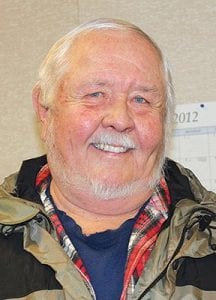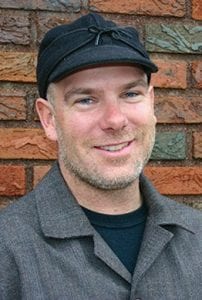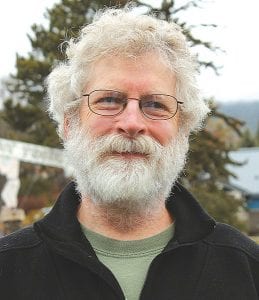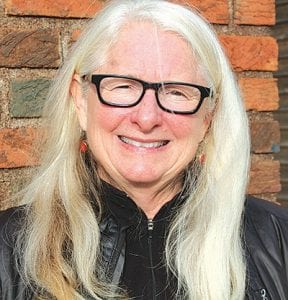Mayoral candidate Larry “Bear” Carlson: I’ve been mayor two years now. I think the commonsense leadership I’ve provided speaks for itself. My education? I have a bachelor’s in physics from St. Olaf and a master’s in physics from UW-Superior. I taught up here for 25 years. I also worked as a charter captain for 6 – 7 years.

The Cook County News-Herald visited this week with the four people running to represent the citizens of Grand Marais. We spoke with incumbent Mayor Larry “Bear” Carlson and his challenger, Adam Harju. And we talked to the two people running for re-election to the city council, Tim Kennedy and Jan Sivertson. Both are running unopposed.
Their answers follow:
One of the most divisive political issues right now is the construction of a new community center. Where do you stand on this issue and do you agree the 50-50 county/city cost share for future operations is fair?
Mayoral candidate Carlson: I’m convinced the community center is a done deal. Whether I agree or not doesn’t matter at this point. I think the agreement to split the possible deficit 50/50 is appropriate.
Mayoral candidate Harju: I absolutely believe that’s a fair split. The city’s going to save $50,000 – $100,000 a year, so that’s a good deal. I am supportive of the community center. The amount of infrastructure we are getting for our investment is huge. Seventy percent of the funding is out-of-town dollars. My hope is that it doesn’t get diluted to where it is not an asset. From the city’s perspective it’s a good deal. Spin-off programs can take place up there and contribute to operations as well. It could really become the hub of the community.

Mayoral candidate Adam Harju: My college degree is in outdoor education. I’m a passionate outdoors person and I’ve been fortunate that most of my career has been in that realm. I have a trailbuilding business. I volunteer for a variety of community activities. I currently serve on the Grand Marais Public Utilities Commission. I’m married to Mica.
City Councilor Kennedy: To start off, I do support the community center. It’s a tremendous asset and will add a great location for people to gather. If we lost the city swimming pool, we would feel a huge loss. The 50/50 agreement? It’s certainly a lower cost to the city than what we’re currently paying. There is a cap on that. I think the value to city residents is more than monetary. Frankly, the city swimming pool was not going to last without major city investment. I know there are some people who don’t want it and won’t benefit. The city manages parks, maintains ball fields and operates the golf course. Not everyone uses these things, but it improves the quality of life. Without them it would be a pretty bleak place.

City Councilor Tim Kennedy: I have bachelor’s degrees in urban affairs and geography from St. Cloud with a background in planning. I worked for 22 years at planning and zoning for Cook County. My wife Beth has her business in Grand Marais and both our kids are here. I have been co-owner of Gunflint Realty since 2003. I’ll be retiring from that at the end of the year. I’ve been on the city council for 9 ½ years – I took over a vacant seat when it was offered. I thought I’d give it a try. It seems to have worked out.
City Councilor Sivertson: I’m behind the construction of a new community center. I think it will be a wonderful asset to the local community and I think it will be a recreational opportunity for the tourism industry that is not weather-dependent. I like that it’s a YMCA. With their business and marketing experience, I think Cook County is in good hands. I wasn’t 100 percent in favor of it being attached to the school. I want to be sure that all of the community has access, but that is why it is good to have the Y involved.
About the 50 percent of the deficit—it’s not half of the operating costs; it’s half of the losses if there are any. The Y projected numbers that did not include tourism use. They were very conservative. I feel really confident about it.

City Councilor Jan Sivertson: I grew up in Duluth and spent most of my life in Wisconsin. I lived in Hancock, MI and Texas for a year. I’m from a 4th generation fishing family and I’ve spent time on Isle Royale nearly every summer. After graduating from UMD with an art degree, I started a gallery in 1980. I have a gallery in Duluth. I’ve worked in Lutsen; had a cabin on the Gunflint Trail. I feel like I’m familiar with all the interconnected facets of the county and the North Shore. The North Shore feels to me like one big neighborhood.
Only a few lots have been sold at the Cedar Grove Business Park and the city may end up making the payment for the infrastructure bonds at the park. Do you think the city can do anything to prevent that from happening?
Mayoral candidate Carlson: We are absolutely obligated to pay the bonds. We had hoped that selling of lots would have paid the bonds. We have reached an agreement with the county where they pay half and the city will pay half. That’s a stopgap measure. The timing was bad. Just as soon as they were ready to sell lots the economy hit bottom. It’s nobody’s fault here.
Mayoral candidate Harju: I don’t know if they can completely prevent it. They can start putting some money in the coffers. They’ve reduced the lot prices, but probably not enough. If someone comes in and sows a viable business plan, help them! We need to get that ball rolling. We need to get to that next wave. The EDA marketing really needs a boost.
City Councilor Kennedy: Obviously we are going to be responsible for the bonds one way or the other. The question is—can we get the lots sold so businesses can pay taxes? And so the park can be the business center we want it to be? There was a request at a recent EDA meeting from a business wanting to purchase a lot at less than the assessment. Personally I think it’s a good idea to get someone to move a business in there. They might employ someone. They will pay taxes. These are things that will be a long-term benefit. Our businesses in there now do that. We need more like them.
City Councilor Jan Sivertson: Ultimately whomever you label as responsible, it comes back to the city. The EDA is half-owned by the city. I think what we can do is work together in the new reality—the reality of decreased real estate sales. I’ve been part of the new economic project with NorthSpan and I’ve learned a lot. There are some business park covenants that are too unrealistic. Between changing the covenants and reducing the lot prices, we can make owning a lot more realistic. It’s cool that the city and the county are working together.
The city council sometimes hears complaints about noise in the city of Grand Marais—from concerts, from a seaplane taking off, from trucks on Highway 61. Do you feel the city has been responsive enough to the people with these concerns?
Mayoral candidate Carlson: Just because someone complains about whatever kind of noise does not mean the city has an obligation to fix it. I think the seaplane is an integral part of our city. It’s a positive addition to our town.
We have ordinances against jake-braking.
We’ve talked with people who have outside bands to get them to temper their noise. But it’s the same as the airplane. There are people who come here for that. They like that party atmosphere. Just so it doesn’t get out of hand.
Mayoral candidate Harju: A lot of thought went into the current noise ordinance. That said, I think the ordinance needs to be re-visited from time to time. The one I hear most about is the seaplane. I sail the Hjordis and I talk to a lot of people. That was a point of contention this year. The city needs to reevaluate that.
The trucks? There is potential to modify where the speed limit drops to 30. If you extend it, then people won’t be jake-braking down the hill. That could resolve that.
I live four blocks from the Birch Terrace and I can hear the music from the Gunflint Tavern on calm nights. It doesn’t bother me. We’ve gained a reputation as a musical city. We are a town and there is noise, whether it is a plane, music or trucks. City Councilor Kennedy: It’s difficult. Obviously people are affected by noise; different people in different ways. We hear about it. It can be music, a plane, sometimes loud power equipment. We’re trying to achieve some kind of balance. People come here for fun and activities like plane rides and concerts. When we created the ordinance, we established hours of operation. We said you can’t have music around the clock. We set reasonable limits and talking with the businesses seemed to help. We know people need to make money and that people are here for quiet. We try to maintain that balance. City Councilor Sivertson: That’s tough. I think the city has been responsive enough. There are some things we have no control over. The seaplane issue—we have yet to deal with that appropriately. For trucks, limits are in place. Having a tourist park in downtown, visitors need to realize there will be noise. For concerts, we created an ordinance, which I think has taken care of it. We’re a city that depends on tourism and I think that means music and art. We have to balance that.
What do you feel is the biggest challenge facing the city of Grand Marais at this time?
Mayoral candidate Carlson: We’ve got some infrastructure needs coming up—a new city garage, a new liquor store, a public restroom facility downtown. These things cost money. To do these things in a timely manner and keep the budget in control, that will be a challenge. That, and making the bond payments at the Cedar Grove Business Park will be a challenge.
Mayoral candidate Harju: I think probably the biggest thing is trying to maintain a certain amount of economic growth so people can continue to live here without selling out to big corporate interests. We all make sacrifices to be here. I think trying to reduce the peaks and valleys of tourism would help.
City Councilor Kennedy: Things are pretty good right now. A lot of people are more concerned about national politics. But coming down to local, people need to know that they can come to a council meeting and talk to us at the beginning. They can call the city council. I think the council is doing a good job keeping our levy in check but that will be a challenge. We’re fortunate to have enterprises to keep our levy in check and we’re looking atwaystokeepthelevydown.We’retryingfora0percentlevy increase. In these economic times, raising taxes is hard. I recognize that.
City Councilor Sivertson: It feels really, really good right now— even with the loss of local government aid, we’ve dealt with that. Probably the biggest challenge is the tax structure with the state and metro area growing. More revenue gets sucked away from small towns.
Otherwise I feel we’re in a really good spot. It feels monumental to me to all be working together. We’re an incredibly bright, talented community, but we don’t always work together. We’re a village of individualists. It’s a great problem to have.


Leave a Reply